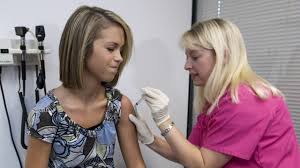UK regulator reports increase in period problems after coronavirus vaccination
06/25/2021 / By Ralph Flores

For women, a change in their period isn’t listed as a side effect of vaccinations. But recent figures from the U.K.’s drug regulator reveal that nearly 4,000 women have reported having problems with their period after being vaccinated.
The report, obtained by The Sunday Times, showed the Medicines and Healthcare Products Regulatory Agency (MHRA) received 2,734 reports of menstrual cycle changes after getting the AstraZeneca vaccine. In addition, the agency received 1,158 reports related to the Pfizer vaccine and 66 reports related to the Moderna vaccine. Most reports were from women aged 30 to 49 and were compiled up to May 17.
According to the agency, actual figures may potentially be higher. Given the condition isn’t included as a potential side effect, many women may have period problems — including cycle changes and heavier-than-usual bleeding — that are unreported.
This side effect wasn’t detected during clinical trials for the vaccines, as the sample size only included thousands of people. As the vaccine was rolled out to millions of people, this side effect — and potentially many others — became apparent.
UK regulator dismisses findings, says reports aren’t enough
The MHRA dismissed the reports of increased period problems, saying that women are at no “increased risk” of these after vaccination. The U.K. regulator also stated that there is no need to add period problems as a possible side effect of vaccination.
Sarah Branch, the agency’s director of vigilance and risk management, said the reported cases aren’t enough to include period problems as a potential post-vaccination risk.
“The number of reports is low in relation to the number of women who have had the vaccine to date and the background rate of menstrual disorders generally,” said Branch, adding that the agency will monitor additional reports for “potential signals.”
It’s worth noting that menstrual problems were included in the agency’s weekly report of side effects of the vaccine. But for Victoria Male, an immune expert at Imperial College London, this report may not reflect the actual figure of women suffering from period problems as a vaccination side effect.
“It’s definitely true that not everyone will be reporting any menstrual changes they have noticed to Yellow Card [the MHRA’s scheme for people to report suspected side effects] simply because not everyone knows that it exists and that they can file a report,” she added.
Male said that women have contacted her to report about period changes after vaccination, but she added that no definitive link has been established. (Related: CDC data show kids most likely have herd immunity from coronavirus, but vaccine trials still ongoing anyway.)
“The kinds of things they are telling me about, mostly periods that are heavier or later than usual, are very similar to the reports we are seeing in Yellow Card.”
Katie Khan, a 39-year-old resident of London, said that her menstrual cycle became erratic after being injected with her first dose of the AstraZeneca vaccine. She told the U.S. Sun that her period became much heavier and much more painful after getting her first shot.
“[It’s] not the cycle I’m used to,” she explained.
The Royal College of Obstetricians and Gynaecologists, a U.K.-based medical association, issued a warning on the matter, saying that women who experience “unusual bleeding” should contact their health care provider.
In the U.S., women have also reported period changes after vaccinations. These were similar to those in the U.K., from periods coming in earlier or later than usual to heavy or unusual bleeding.
Pandemic.news has more stories on vaccine side effects.
Sources include:
Tagged Under: Big Pharma, immunization, menstruation, pandemic, period problems, pharmaceutical fraud, vaccine, vaccine injury, vaccines, women's health
RECENT NEWS & ARTICLES
Pandemic.News is a fact-based public education website published by Pandemic News Features, LLC.
All content copyright © 2018 by Pandemic News Features, LLC.
Contact Us with Tips or Corrections
All trademarks, registered trademarks and servicemarks mentioned on this site are the property of their respective owners.





















